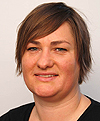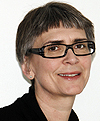Programme group: Meeting the User
 |
 |
| Chairwoman of the programme group in 2009: Tina Pipa |
Acting chairwoman: Karen Harbo |
The programme group Meeting the User focuses on
- user access to and use of information
- the libraries’ communication with users, including teaching, mediation, marketing of information, services and products
The programme group initiates activities and projects that increase the users’ perception of relevance and immediacy in the meeting with the digital and physical library in order to create a heightened exploitation of the libraries’ services, products and activities, including learning and research.
It is the opinion of the programme group that the libraries must have a ready supply of methods for identifying the users’ behaviour and needs, as well as strategically to concentrate on the users in the process of library development. The programme group finds that here lies an unexplored potential in increased understanding and inclusion of the web 2.0 phenomenon in order to strengthen the meeting between library and user.
In the action plan for 2009-2010 the programme group therefore focuses on four action lines:
- Potential for DEFF in exploitation and usage of web 2.0
- Knowledge of and methods for identification of user behaviour and needs
- Development of relevant web 2.0 products to be implemented and evaluated
- Strengthened knowledge sharing, including aiming at an extended staff-driven development culture in the DEFF libraries
Activities
In 2009 the programme group has been working on the planning of two major project activities which aim to attract broad participation from all types of DEFF libraries.
The project Brugerkaravanen (User Caravan), which takes place in Aarhus, Copenhagen, Odense and Aalborg, belongs under action lines 2 and 4. The project finishes with a National User Theme Day in Aarhus. Both taking place in the spring of 2010. This activity focuses on knowledge about and methods for identification of user behaviour as well as increased knowledge sharing and extended staff-driven development culture.
Action lines 1 and 3 include an expert workshop for problem focusing, held in autumn 2009. Here the programme group had invited experts from all over the country to a workshop on the use of web 2.0 and social technologies in Danish academic and research libraries. The programme group had prior to this event studied the DEFF libraries’ development strategies to examine what kind of role the users play in these. A role, which at the workshop would be confronted with the specialists’ perception of students and researchers in Danish educational institutions – and their wishes as to web 2.0-based library service.
The workshop was facilitated by a process consultant and resulted in a number of framework proposals, which the programme group subsequently has been engaged in transforming into concrete projects. In 2010 approval will be sought for these projects from the DEFF steering committee and project partners will be looked for among the DEFF libraries. The projects will focus on the potential in the exploitation and usage of web 2.0 for DEFF as well as development of applicable web 2.0 products to be implemented and evaluated.
In the case of both Expert workshop and the project User Caravan the programme group has sought inspiration ’outside the box’ - with parties outside traditional library context – for the planning and execution. This being done in order to fulfil the programme group’s objective about supporting user logic instead of library logic.
Perspectives
The programme group, in collaboration with colleagues in the DEFF libraries, will in 2010 continue the work with the realisation of the above project activity as well as keep the focus on mediation and implementation of the results of the projects, whether it be in the form of experiences, knowledge or products. It is the wish of the programme group that the project activities that have been launched should leave their marks in the DEFF libraries. Sustainability is very important to the programme group, and the group is going to work and advocate for this subject to continue to be discussed in and between the programme groups as well as in the broader spectrum of DEFF.
Read more at the programme group’s wiki http://mmb.deff.wikispaces.net/
| ![]() Forrige | Næste
Forrige | Næste ![]() | | Til sidens top |
| | Til sidens top |
This page is chapter 10 of 18 of the publication "Denmark´s Electronic Research Library, Annual Report 2009".
Publication may be found at the address http://www.bibliotekogmedier.dk/fileadmin/publikationer/publikationer_engelske/deff_annual_2009/index.htm
© 2010

